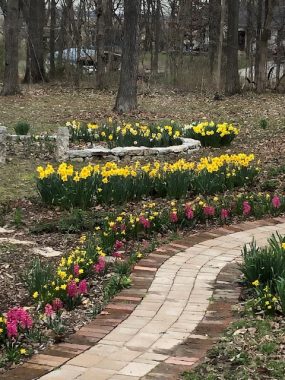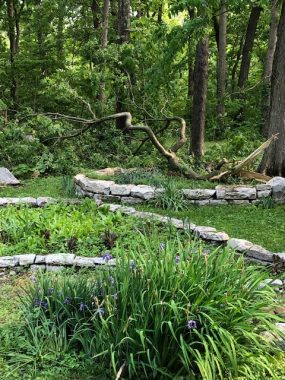The Resilience of Spring, My Garden, and Life With Parkinson’s
Written by |

Resilience is the single best predictor of success in life and in building sanctuary. When you live in a tornado-prone area, building a garden sanctuary can be risky. Spring is the time to revitalize from winter. My garden sanctuary uplifts my soul with vibrant blooms.
It was built one brick at a time, one flower at a time. But in the face of tornadoes, it requires resilience.

Dr. and Mrs. Dr. C’s garden in April. (Photo by Mrs. Dr. C)
Mrs. Dr. C was mowing the side lawn and I was raking the gravel driveway. I looked over to see where she was and noticed that the sky was dark with that eerie green cast, ominously predicting a storm. I jumped in front of the mower, energetically waving and pointing toward the flickers of lightning just visible through the towering tree beside our home.
She acknowledged me by signaling she was headed to the garage. We both made it inside just as the rain hit — hard.
I calmly yet urgently checked the storm tracker on the television and Mrs. Dr. C checked her cellphone. Both indicated that our area was under a tornado watch. This isn’t unusual; we get these a few times a year. This time, the storm path was tracking directly toward our garden sanctuary.
We suddenly found ourselves in a surreal scene. From our safe vantage point inside the house, we could see our garden sanctuary blasted by a rushing tsunami of rain, leaves, and broken branches. Everything was being blown horizontally, blocking the scenic vista and submerged by a wall of wind, water, and broken tree limbs.
As the debris pummeled the house, I thought, “How similar to hail …” but still quite distinct. A large branch crashed onto the roof. We moved a little farther toward the center of the house. Another large crack, and then a loud thud. Another big branch down, on the garden away from the house.
Then it was abruptly and uncomfortably quiet.

The garden in May. (Photo by Mrs. Dr. C)
The news broadcast said that a category 1 tornado on the Enhanced Fujita Scale had touched down close. It jumped over the house before whirling across the fields. We were blessed — only minor damage and lots of garden cleanup.
We love time spent in our garden sanctuary. Building and maintaining it rejuvenates so many aspects of our well-being. It takes years and small steps, one brick at a time. Brain retraining to manage Parkinson’s and other chronic diseases is similar.
I’m proposing a Parkinson’s self-management toolkit. Each of us faces diverse challenges and symptoms. What remains constant is suffering. Trees will fall on our sanctuary; that is the nature of life. How I choose to deal with those challenges has taken on deeper meaning since the onset of my Parkinson’s.
Resilience is a big factor in how we handle life’s tornadic incidents. The American Psychological Association defines resilience as “the process and outcome of successfully adapting to difficult or challenging life experiences, especially through mental, emotional, and behavioral flexibility and adjustment to external and internal demands.”
How well we adapt to adversity depends on how we view and engage with the world, what social resources are available, and our specific coping strategies.
I’m not averse to modern medicine, but I firmly believe that we cannot rely solely upon taking medication without attending to mental and physical well-being. Appropriate medication management can help, but it can’t solve everything. It is enhanced by evidence-based mental and physical health practices.
A review article published in Patient Education and Counseling in 2017 found that, “Evidence to support specific self-management programs for persons with Parkinson’s disease was limited.” We are just now beginning to think about and discuss the positive effects of a healthy lifestyle and outlook for Parkinson’s patients.
An article published in the journal Parkinson’s Disease in 2020 shared results from a study in which participants in the Swedish National Parkinson School (a self-management program for people with Parkinson’s and their care partners) self-reported on their outcomes:
“Improvements in [constructive attitudes and approaches] reflect a shift in how persons view the impact of disease in their everyday lives and are connected to a mindset of not allowing disease to control their lives. Improvements in skill and technique acquisition reflect better knowledge of skills and techniques to manage and cope with the impact of PD, including symptoms and problems in everyday life.”
We can combine an improved sense of resilience (“I am tougher than I think I am”) with the mindset that chronic diseases like Parkinson’s will not totally control us, to the detriment of our life, liberty, and pursuit of happiness.
With a little care, the damage left by the storm will mend. The twister-torn terrain nurtures sanctuary back to a place of healing. Every day I construct my life to be resilient, not succumbing to the storms of Parkinson’s. Resilience helps manage my Parkinson’s, not cure it.
And we are still picking up branches!
Note: Parkinson’s News Today is strictly a news and information website about the disease. It does not provide medical advice, diagnosis, or treatment. This content is not intended to be a substitute for professional medical advice, diagnosis, or treatment. Always seek the advice of your physician or another qualified health provider with any questions you may have regarding a medical condition. Never disregard professional medical advice or delay in seeking it because of something you have read on this website. The opinions expressed in this column are not those of Parkinson’s News Today or its parent company, Bionews, and are intended to spark discussion about issues pertaining to Parkinson’s disease.




Mike
Dr C.
If we could not bounce back from our initial diagnosis I would be depressed and sorrowful. Your articles are part of the stimulation that help me stay positive. Mindful Movement Is how I stay limber. Exercise is a very useful in keeping my spirit up. Lately I have been doing Qui Gong which combined with Accupuncture has been very positive and contributed to positive Brain Rewiring for me.
Of late I have been thinking about feelings of refreshment. My garden has a Peach and Plum tree , Irises and cactus. We live in Sedona, Arizona so all I have to do is water them. We are in Monsoon season now which also can be surreal during a big storm.. It also waters our trees naturally which is very helpful. Ripened fruit is a reward that keeps giving!
I really like to track your articles as you demonstrate the Reframing that helps us to survive or even thrive with this Parkinson’s condition. Blessings,Mike
Vickie Paul
Thank you for your insights into what what I refer to as adapting to the challenges of Parkinson’s. First, your comment that diagnosis at 65 is early onset. My diagnosis at 66 to my current 74, doesn’t seem so long now. Maybe I’m not as far down the path of the inevitable as I thought.
Your toolkit is a terrific resource / framework for mapping out paths of resilience both physical and mental. While I am grateful for my carbolevadopa, Nupro patch, and resagoline medications, I’ve found it is essential to follow through with tools like physical therapy, voice therapy (choir is a hoot), aqua therapy. My previous go to meetings of TaiChi , yoga, and Feldenkrais we’re not available during Covid except virtually. But There is no better kick in life’s funny bone than 20 people in a room doing downward dog. It’s just not the same.
The trick is figuring out what works now, is worth trying in future or needs to be pruned. Your approach is definitely a keeper.
A footnote) I’m asking you as a clinician who has designed and analyzed many trials over the years: The last time I participated in one I found what I believe to be a significant bias. I wanted to share my experience at an improved outcome, but there was no response in the multiple choice format where I could record a positive outcome. Not sure if this is a real problem out there, but anything that falsely excludes meaning data is a potential problem.
Dr. C.
Hi Vickie ~ One thing you don't mention in your wonderful collection of self-management tools is your sense of humor and lightness of being. Got quite a visual on the Yoga downward dog... oh don't go there. When it comes to treatment outcome studies, there are all kinds of worms in that can. Stay tuned, we've got lots more exciting stuff coming in the next columns. BTW, we're taking September off to regroup and work on consolidating the next book, "Possibilities with Parkinson's: Self-Management Toolkit". But we'll back in October!
Dr. C.